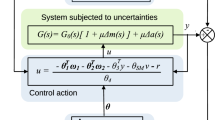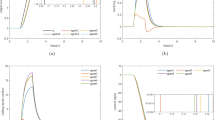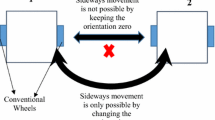Abstract
In this paper, the tracking control problem of a class of mechanical manipulator system with actuator fault and mismatched disturbance is investigated. An observer-based adaptive fast finite-time sliding mode fault-tolerant control (OB-AFTSMFTC) scheme is proposed. Firstly, a novel composite observer is designed to estimate the state, fault efficiency factor, and disturbance simultaneously without the disturbance bound information. It is theoretically proved that the entire observer system is globally stable. To address the tracking performance, the Euler’s discretization technique is applied to approximate the discrete-time tracking error model. Subsequently, an OB-AFTSMFTC strategy is proposed based on the tracking error. In the proposed control scheme, two adaptive parameters are designed to realize the autonomous adjustment of controller parameters, thus the work of parameter adjustment can be reduced and a faster convergence can be achieved. Furthermore, the estimated disturbance information is utilized to construct the sliding mode controller in order to improve the robustness of the tracking performance. Finally, two simulation cases are carried out to verify the fault tolerance ability of the proposed method.
Similar content being viewed by others
References
Y. Wu and L. Yao, “Fault diagnosis and fault tolerant control for manipulator with actuator multiplicative fault,” International Journal of Control, Automation, and Systems, vol. 19, no. 5, pp. 980–987, February 2021.
H. Wang, “Adaptive control of robot manipulators with uncertain kinematics and dynamics,” IEEE Transactions on Automatic Control, vol. 62, no. 2, pp. 948–954, February 2017.
J. Baek, S. Cho, and S. Han, “Practical time-delay control with adaptive gains for trajectory tracking of robot manipulators,” IEEE Transactions on Industrial Electronics, vol. 65, no. 7, pp. 5682–5692, July 2018.
A. Dumlu and K. Erenturk, “Trajectory tracking control for a 3-DOF parallel manipulator using fractional-order control,” IEEE Transactions on Industrial Electronics, vol. 61, no. 7, pp. 3417–3426, 2014.
B. Xiao, S. Yin, and O. Kaynak, “Tracking control of robotic manipulators with uncertain kinematics and dynamics,” IEEE Transactions on Industrial Electronics, vol. 63, no. 10, pp. 6439–6449, October 2016.
M. Tran and H. Kang, “Adaptive terminal sliding mode control of uncertain robotic manipulators based on local approximation of a dynamic system,” Neurocomputing, vol. 228, pp. 231–240, May 2017.
D. Zhang, Z. Shen, and Y. Song, “Robust adaptive fault-tolerant control of nonlinear uncertain systems tracking uncertain target trajectory,” Information Science, vol. 415–416, pp. 446–460, November 2017.
L. Cao and Y. Wang, “Fault-tolerant control for nonlinear systems with multiple intermittent faults and time-varying delays,” International Journal of Control, Automation, and Systems, vol. 16, pp. 609–621, March 2018.
L. Zhang and J. Liu, “Adaptive boundary control for flexible two-link manipulator based on partial differential equation dynamic model,” IET Control Theory and Applications, vol. 7, no 1, pp. 43–51, January 2013.
M. Van, S. S. Ge, and H. Ren, “Finite time fault tolerant control for robot manipulators using time delay estimation and continuous nonsingular fast terminal sliding mode control,” IEEE Transactions on Cybernetics, vol. 47, no. 7, pp. 1681–1693, July 2017.
Y. Kang, Z. Li, Y. Dong, and H. Xi, “Markovian-based fault-tolerant control for wheeled mobile manipulators,” IEEE Transactions on Control Systems Technology, vol. 20, no. 1, pp. 266–276, January 2012.
B. Guo and Y. Chen, “Output integral sliding mode fault tolerant control for nonlinear systems with actuator fault and mismatched disturbance,” IEEE Access, vol. 6, pp. 59383–59393, October 2018.
M. Li and Y. Chen, “Robust tracking control of networked control systems with communication constraints and external disturbance,” IEEE Transactions on Industrial Electronics, vol. 64, no. 5, pp. 4037–4047, May 2017.
H. Yang and S. Yin, “Descriptor observers design for Markov jump systems with simultaneous sensor and actuator faults,” IEEE Transactions on Automatic Control, vol. 64, no. 8, pp. 3370–3377, August 2019.
Z. Y. Chu, J. Cui, and F. C. Sun, “Fuzzy adaptive disturbance-observer-based robust tracking control of electrically driven free-floating space manipulator,” IEEE Systems Journal, vol. 8, no. 12, pp. 343–352, June 2014.
M. Boukens, A. Boukabou, and M. Chadli, “Robust adaptive neural network-based trajectory tracking control approach for nonholonomic electrically driven mobile robots,” Robotics and Autonomous Systems, vol. 92, pp. 30–40, March 2017.
S. Emre, S. Hiromu, N. Takahiro, U. Barkan, and O. Kouhei, “A stability analysis for the acceleration-based robust position control of robot manipulators via disturbance observer,” IEEE/ASME Transactions on Mechatronics, vol. 23, no. 3, pp. 2369–2378, February 2018.
B. Guo and Y. Chen, “Robust adaptive fault tolerant control of four wheel independently actuated electric vehicles,” IEEE Transactions on Industrial Informatics, vol. 16, no. 5, pp. 2882–2894, May 2020.
P. Yang, Z. Liu, D. Li, Z. Zhang, and Z. Wang, “Sliding mode predictive active fault-tolerant control method for discrete multi-faults system,” International Journal of Control, Automation, and Systems, vol. 19, no. 3, pp. 1228–1240, March 2021.
B. Xiao, S. Yin, and H. Gao, “Reconfigurable tolerant control of uncertain mechanical systems with actuator faults: A sliding mode observer-based approach,” IEEE Transactions on Control Systems Technology, vol. 26, no. 4, pp. 1249–1258, July 2018.
Y. Zhu, J. Qiao, and L. Guo, “Adaptive sliding mode disturbance observer-based composite control with prescribed performance of space manipulators for target capturing,” IEEE Transactions on Industrial Electronics, vol. 66, no. 3, pp. 1973–1983, March 2019.
H. Du, X. Chen, G. Wen, X. Yu, and J. Lü, “Discrete-time fast terminal sliding mode control for permanent magnet linear motor,” IEEE Transactions on Industrial Electronics, vol. 65, no. 12, pp. 9916–9927, December 2018.
S. D. Xu, C. C. Chen, and Z. L. Wu, “Study of nonsingular fast terminal sliding-mode fault-tolerant control,” IEEE Transactions on Industrial Electronics, vol. 62, no. 6, pp. 3906–3913, June 2015.
Y. Wu, J. Chen, X. Zhou, J. Cao, and M. Luo, “Asynchronous filtering for nonhomogeneous Markov jumping systems with deception attacks,” Applied Mathematics and Computation, vol. 394, Article 125790, April 2021.
J. Cheng, W. Huang, J. H. Park, and J. Cao, “A hierarchical structure approach to finite-time filter design for fuzzy Markov switching systems with deception attacks,” IEEE Transactions on Cybernetics, pp. 1–11, 2021. DOI: https://doi.org/10.1109/TCYB.2021.3049476
J. Cheng, Y. Wu, L. Xiong, J. Cao, and J. H. Park, “Resilient asynchronous state estimation of Markov switching neural networks: A hierarchical structure approach,” Neural Networks, vol. 135, pp. 29–37, March 2021.
H. Yang, Y. Jiang, and S. Yin, “Fault-tolerant control of time-delay Markov jump systems with Ito stochastic process and output disturbance based on sliding mode observer,” IEEE Transactions on Industrial Informatics, vol. 14, no. 12, pp. 5299–5307, December 2018.
H. Yang, Y. Jiang, and S. Yin, “Adaptive fuzzy fault tolerant control for Markov jump systems with additive and multiplicative actuator faults,” IEEE Transactions on Fuzzy Systems, vol. 29, no. 4, pp. 772–785, April 2021.
Author information
Authors and Affiliations
Corresponding author
Additional information
Publisher’s Note Springer Nature remains neutral with regard to jurisdictional claims in published maps and institutional affiliations.
This work was supported in part by the National Natural Science Foundation of China under grant 61973331 and 61903064, and the National Key Research and Development Plan Programs of China 2018YFB0106101.
Yong Chen received his B.S. degree in industrial automation from Taiyuan University of Science and Technology, Taiyuan, Shanxi, in 2001, an M.S. degree in control theory and control engineering from Guangxi University, Nanning, Guangxi, in 2004 and a Ph.D. degree in control theory and control engineering from Chongqing University, Chongqing, in 2007. Since 2007, he joined University of Electronic Science and Technology of China (UESTC). Since 2015, he has been a Professor and a Ph.D. Supervisor in the School of Automation Engineering and the Director of the Institute of Electric Vehicle Driving System and Safety Technology, UESTC. He was a Visiting Scholar in University of Adelaide from 2013 to 2014. He is currently presiding some projects including National Natural Science Foundation of China project, National Key Research and Development Plan Programs of China and the Scientific and Technical Supporting Programs of Sichuan Province. He has published more than 80 technical papers in journals and 40 Chinese patents. His current research interests include fault-tolerant control, network control, and intelligent connected system.
Bin Guo received his B.S. degree in machine design manufacture and automation and an M.S. degree in mechatronic from Sichuan University of Science and Engineering, Zigong, China, in 2013 and 2016, respectively. He is currently working toward a Ph.D. degree in control science and engineering with the School of Automation, University of Electronic Science and Technology of China, Chengdu, China. From September 2018 to September 2019, he was a Visiting Student with the University of Duisburg-Essen. His research interests include robust control, fault tolerant control, and adaptive control.
Yuezhi Liu received his B.S. degree in mathematics and applied mathematics from Daqing Normal University in 2014, and an M.S. degree in applied math from Xihua University in 2017. He is currently pursuing a Ph.D. degree in control science and engineering from the School of Automation Engineering, University of Electronic Science and Technology of China. His current research interests include cyber-physical system, adaptive control, event-triggered control, and nonlinear system.
Ke Zhang received his B.S. degree in chemistry and chemical engineering from Nanjing University of Science and Technology. He is with deputy factory director and senior engineer in Jiangnan Industries Group Co., Ltd, Norinco Group. His current research interests include security management and flexible production.
Rights and permissions
About this article
Cite this article
Chen, Y., Guo, B., Liu, Y. et al. Adaptive Fault-tolerant Control for Mechanical Manipulator Systems with Actuator Fault. Int. J. Control Autom. Syst. 20, 2326–2339 (2022). https://doi.org/10.1007/s12555-021-0128-7
Received:
Revised:
Accepted:
Published:
Issue Date:
DOI: https://doi.org/10.1007/s12555-021-0128-7




